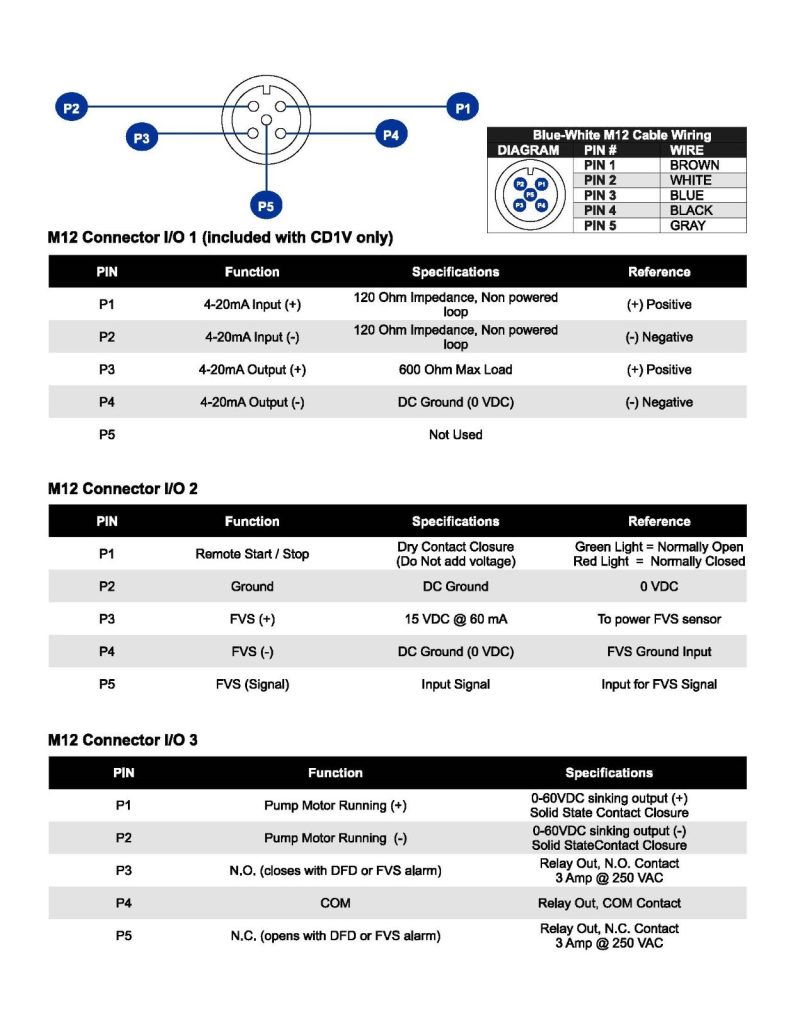Industrial
A1
Installation
What’s in the Box
The A1 Pump is shipped with the following contents:
- A1 Peristaltic Metering Pump
- Discharge injection fitting with check valve
- Suction tube – clear PVC – 5′ length (3/8″ OD, 1/4″ ID)
- Suction foot valve/strainer
- Suction ceramic weight
- Discharge tube – opaque polyethylene – 5′ length (3/8″ OD, 1/4″ ID)
- Mounting hardware kit
- Display shield
- Power Cord (if ordered)
Preparation
The A1 Pump is designed to withstand outdoor conditions, although it is recommended to locate the pump in a protected enclosure for maximum pump life. A cool, dry location where the unit can be easily monitored is recommended. Special ventilation is not required.
The pump can be mounted on a level flat surface, or the pump can be wall-mounted using the provided bracket. Blue-White also offers a sturdy polyethylene (PE) Wall Shelf to mount the pump.
Piping and Physical Installation
The A1 Pump must be level to ensure pumping accuracy.
If mounting the pump to the wall using the provided wall bracket, follow these instructions:
- Use the diagram and drawing on the manual (or below) to mount the bracket to a secure wall location. We recommend mounting the pump at a height where the display and indicator lights are easily visible, and where it can be easily serviced.
- Ensure the bracket is mounted level and screws are secure and will support the weight of the pump and any connected tubing.
- Lower the pump so the tab on the wall bracket is inserted into the slot on the back of the pump. The pump will snap into place and is now secure. To release and remove the pump, reach to the back of the pump and pull the tab forward while lifting the pump

If mounting the pump to the floor or shelf, follow these instructions:
- Place the bracket on a flat and level surface. Secure the bracket to the base using screws.
- Place the pump on the mounted bracket.
Connecting Suction and Discharge Tubing/Piping
A1 Pump tube elements have three options for connections. Either 1/4’” x 3/8” tubing connections (designated by “T” in the pump or tubing part number), or ½” MNPT connection (designated by an “M” in the pump and tubing part number), or ½” Male BSPT Fitting (designated by an “MB” in the pump and tubing part number.)
If ordered with the ¼” x 3/8” tubing connections “T”, the pump will come with suction and discharge tubing, and suction strainer, and a discharge injection valve. If ordered with ½” MNPT “M” or ½” Male BSPT “MB” connection, the pump will come with a suction strainer and discharge injection valve only.
Before connecting the tubing to the pump, be sure the pump is OFF. Wear protective clothing and eye protection when connecting tubing to chemicals or chemical lines.
Connect the suction tubing to the pump, and place and secure the other end of the suction tubing in the chemical tank/source. Using the provided foot valve/strainer and weight is recommended.
Connect the discharge tubing to the pump and then connect the other end to the discharge point. If using the provided injection valve, be sure to mount it in an upward position to prevent air bubbles from collecting.
Note: We highly recommend installing a check valve on the discharge side of the pump. The check valve can be in the form of an injection check valve, in-line check valve, quick disconnect check valve or similar. When there is a tube leak, the check valve will prevent chemicals from the discharge line to continually feed into the pump head.
(Add a diagram showing typical pump installation.)
Wiring
Power Wiring
The A1 is powered by 100 to 240VAC, 50/60Hz power. Use the provided 6’ power cord, and attach the cord at the bottom of the pump.
A removable power cord is included if the pump is ordered with either a “4” 115V 50/60Hz-NEMA 5/15 plug(US), or a “5” 220V 50/60Hz-CEE 7/V11 plug. See accessories for alternate power cord options (ordered separately.) If using a power cord not provided by Blue-White, the cord must be IEC C13 rated at 250 volts.
Control Wiring
The A1 pump has two options, the “A1F” model and the “A1V” model. The “A1F” model has two (2) M12 male connectors (5 pin) on the right side for connection to signal wiring, while the “A1V” version has three (3) M12 male connectors (5 pin).

Connection to the M12 must be accomplished with shielded and insulated M12 cables with a 250VAC voltage rating. (M12 cables are not included with the pump. See accessories or purchase separately.)
Signal connection to the “A1F” model includes:
- Remote Start/Stop Input (Dry Contact Closure)
- FVS (Flow Verification System) Input
- Pump Motor Running Output
- Alarm Output (FVS or TFD+ leak detection)
Signal connection to the “A1V” model includes:
- 4-20mA Input (pump speed control)
- 4-20mA Output (motor speed)
- Remote Start/Stop Input (Dry Contact Closure)
- FVS (Flow Verification System) Input (from flow meter/sensor)
- Pump Motor Running Output
- Alarm Output (FVS or TFD+ leak detection)
See the below Wiring Chart for information and specifications in connecting to your electrical and control system.

Refer to the instructions in the manual for detailed information.
FAQs
Frequently Asked Questions
A1 Installation
- What steps must I take with installation to prevent electrical noise interference.?
The following are steps that can be taken to prevent electrical noise interference during installation:
- Use shielded cables: Shielded cables are designed to protect against electrical noise interference. The shield is a conductive material that surrounds the cable and helps to block the noise.
- Keep cables away from sources of noise: Sources of noise can include power lines, fluorescent lights, and motors. Keep cables away from these sources as much as possible.
- Use surge suppressors: Surge suppressors can help to protect against electrical noise interference. They do this by absorbing the noise and preventing it from reaching the equipment.
- Use grounding: Grounding helps to dissipate electrical noise. Ground the equipment to a reliable earth ground.
- Ask me a question!
Copyright © 2024 Blue-White
